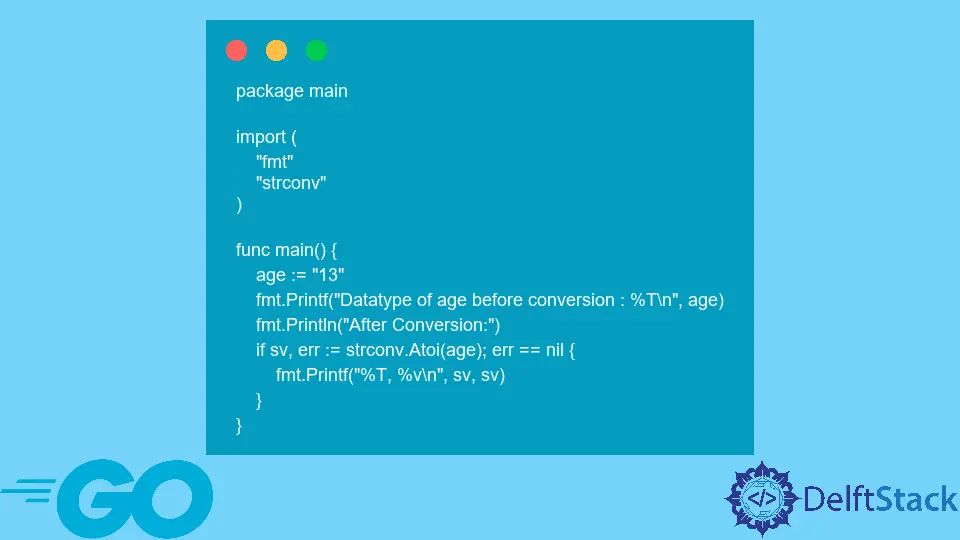How to Convert String to Integer Type in Go
-
Atoi()Function FromstrconvPackage -
ParseInt()Function FromstrconvPackage -
fmt.SscanfMethod - Comparison of Methods

Go is the statically typed language meaning if we define the variable as int, it can only be int; we can’t assign the string to it without converting the string data type of a variable. Go has an inbuilt package called strconv that provides three functions Atoi(), Sscanf(), and ParseInt() to convert Go string to int.
Atoi() Function From strconv Package
Package strconv implements conversions to and from string representations of basic data types. To convert a string into an integer number, we use the Atoi() function from strconv package. Atoi stands for ASCII to integer.
package main
import (
"fmt"
"strconv"
)
func main() {
age := "13"
fmt.Printf("Datatype of age before conversion : %T\n", age)
fmt.Println("After Conversion:")
if sv, err := strconv.Atoi(age); err == nil {
fmt.Printf("%T, %v\n", sv, sv)
}
}
Output:
Datatype of age before conversion : string
After Conversion:
int, 13
If the input string isn’t in the integer format, then the function returns zero.
package main
import (
"fmt"
"strconv"
)
func main() {
age := "abc"
fmt.Printf("Datatype of age before conversion : %T\n", age)
fmt.Println("After Conversion:")
sv, _ := strconv.Atoi(age)
fmt.Printf("%T, %v\n", sv, sv)
}
Output:
Datatype of age before conversion : string
After Conversion:
int, 0
ParseInt() Function From strconv Package
strconv.ParseInt(s, base, bitSize) method interprets the input string s in the given base (0, 2 to 36) and bit size (0 to 64) and returns a corresponding integer. Atoi(s) is equivalent to ParseInt(s, 10, 0).
package main
import (
"fmt"
"reflect"
"strconv"
)
func main() {
x := "123"
fmt.Println("Value of x before conversion: ", x)
fmt.Println("Datatype of x before conversion:", reflect.TypeOf(x))
intStr, _ := strconv.ParseInt(x, 10, 64)
fmt.Println("Value after conversion: ", intStr)
fmt.Println("Datatype after conversion:", reflect.TypeOf(intStr))
}
Output:
Value of x before conversion: 123
Datatype of x before conversion: string
Value after conversion: 123
Datatype after conversion: int64
fmt.Sscanf Method
fmt.Sscanf() is great for parsing custom strings holding a number. Sscanf() function scans the argument string, storing successive space-separated values into successive arguments as defined by the format and returns the number of items successfully parsed.
package main
import (
"fmt"
)
func main() {
s := "id:00234"
var i int
if _, err := fmt.Sscanf(s, "id:%5d", &i); err == nil {
fmt.Println(i)
}
}
Output:
234
Comparison of Methods
The strconv.ParseInt() is the fastest of all methods, strconv.Atoi() is a bit slower than strconv.ParseInt() and fmt.Sscanf() is slowest of all but most flexible method.
Suraj Joshi is a backend software engineer at Matrice.ai.
LinkedIn